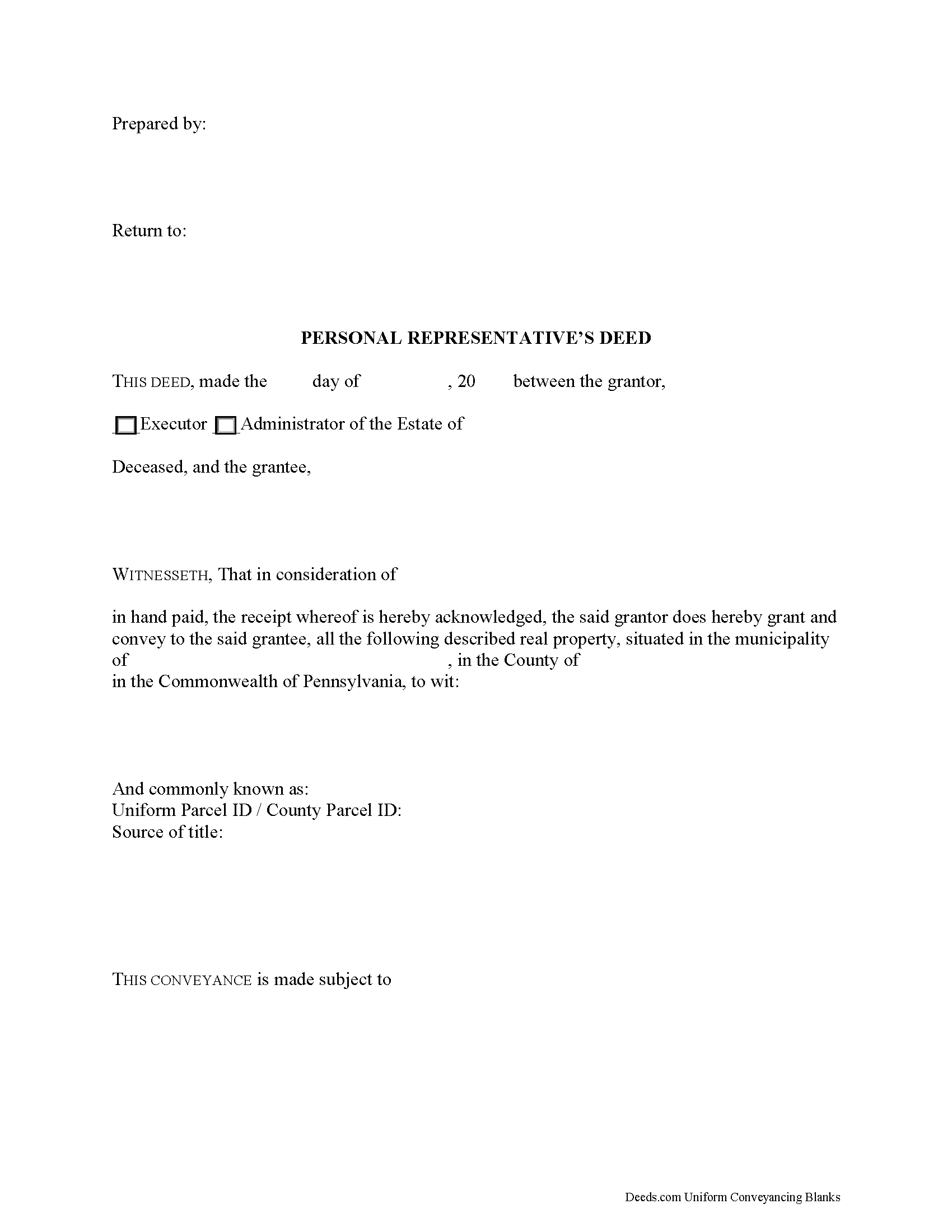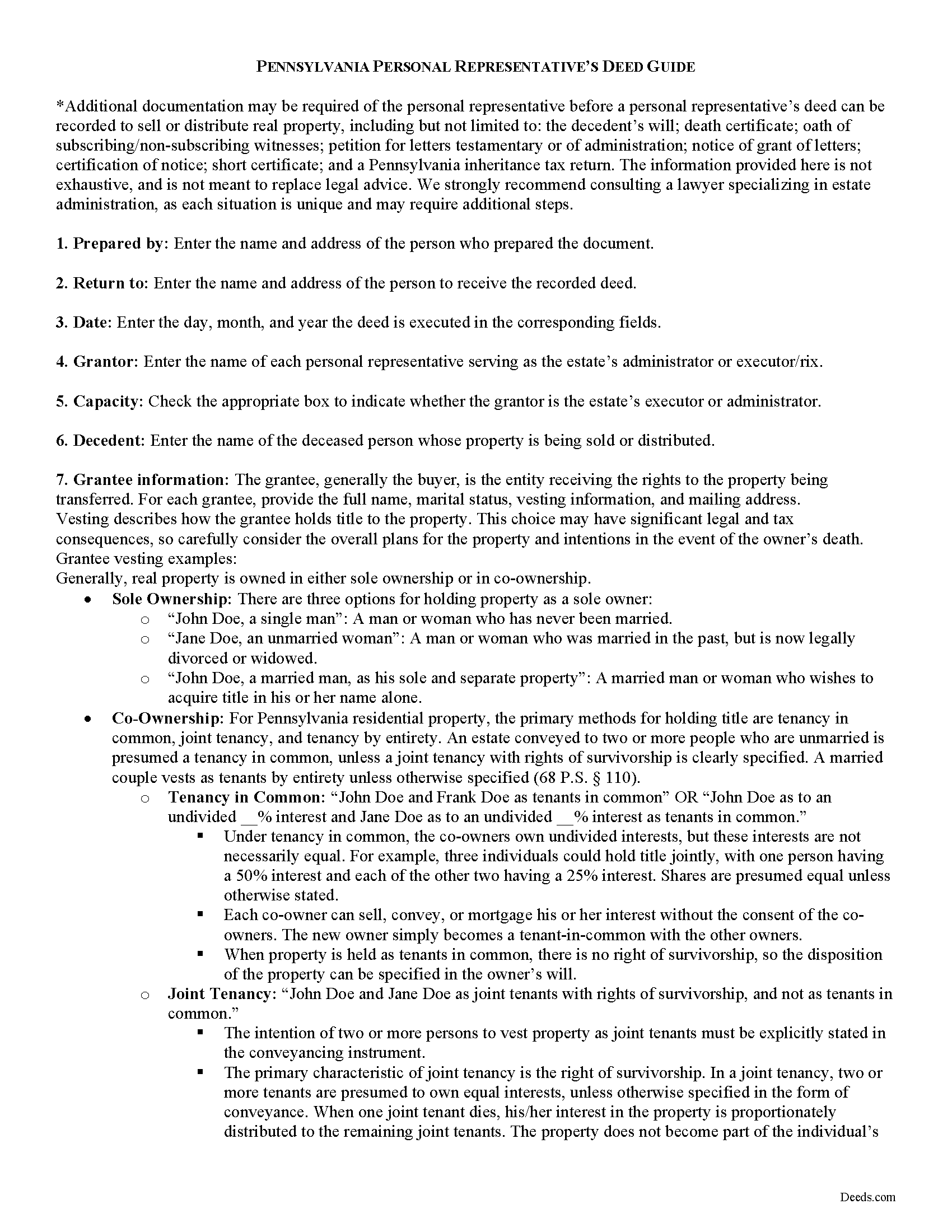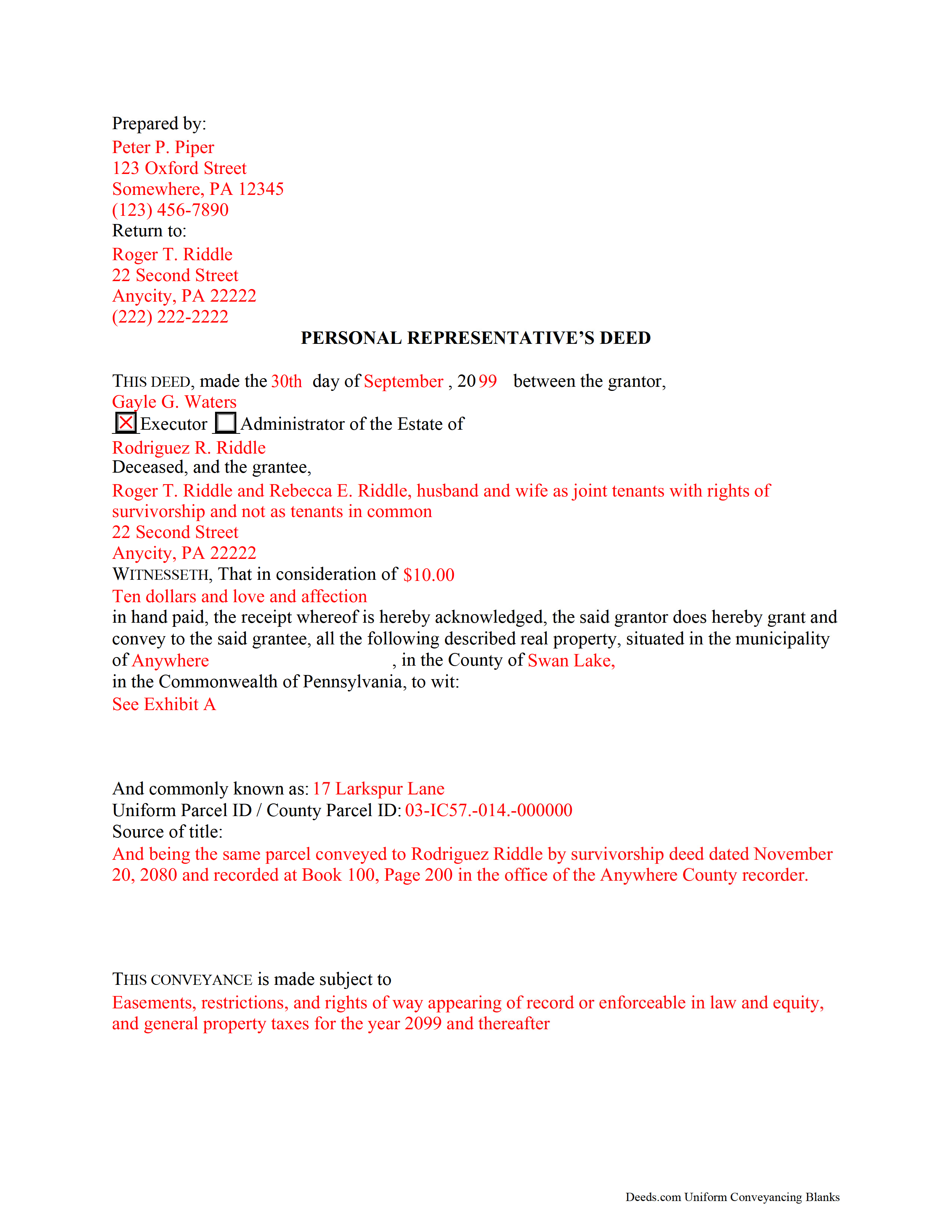Montgomery County Personal Representative Deed Form

Montgomery County Personal Representative Deed Form
Fill in the blank form formatted to comply with all recording and content requirements.

Montgomery County Personal Representative Deed Guide
Line by line guide explaining every blank on the form.

Montgomery County Completed Example of the Personal Representative Deed Document
Example of a properly completed form for reference.
All 3 documents above included • One-time purchase • No recurring fees
Immediate Download • Secure Checkout
Additional Pennsylvania and Montgomery County documents included at no extra charge:
Where to Record Your Documents
Montgomery County Recorder of Deeds
Norristown, Pennsylvania 19404-0311
Hours: 8:30 to 4:15 M-F
Phone: (610) 278-3289
Recording Tips for Montgomery County:
- Bring your driver's license or state-issued photo ID
- Both spouses typically need to sign if property is jointly owned
- Recorded documents become public record - avoid including SSNs
- Check margin requirements - usually 1-2 inches at top
Cities and Jurisdictions in Montgomery County
Properties in any of these areas use Montgomery County forms:
- Abington
- Ambler
- Arcola
- Ardmore
- Audubon
- Bala Cynwyd
- Blue Bell
- Bridgeport
- Bryn Athyn
- Cedars
- Cheltenham
- Collegeville
- Colmar
- Conshohocken
- Creamery
- Dresher
- Eagleville
- Earlington
- East Greenville
- Elkins Park
- Fairview Village
- Flourtown
- Fort Washington
- Franconia
- Frederick
- Gilbertsville
- Gladwyne
- Glenside
- Green Lane
- Gwynedd
- Gwynedd Valley
- Harleysville
- Hatboro
- Hatfield
- Haverford
- Horsham
- Huntingdon Valley
- Jenkintown
- King Of Prussia
- Kulpsville
- Lafayette Hill
- Lansdale
- Lederach
- Mainland
- Merion Station
- Mont Clare
- Montgomeryville
- Narberth
- Norristown
- North Wales
- Oaks
- Oreland
- Palm
- Pennsburg
- Perkiomenville
- Plymouth Meeting
- Pottstown
- Red Hill
- Royersford
- Salford
- Salfordville
- Sassamansville
- Schwenksville
- Skippack
- Souderton
- Spring House
- Spring Mount
- Sumneytown
- Telford
- Tylersport
- Valley Forge
- West Point
- Willow Grove
- Worcester
- Woxall
- Wyncote
- Wynnewood
- Zieglerville
Hours, fees, requirements, and more for Montgomery County
How do I get my forms?
Forms are available for immediate download after payment. The Montgomery County forms will be in your account ready to download to your computer. An account is created for you during checkout if you don't have one. Forms are NOT emailed.
Are these forms guaranteed to be recordable in Montgomery County?
Yes. Our form blanks are guaranteed to meet or exceed all formatting requirements set forth by Montgomery County including margin requirements, content requirements, font and font size requirements.
Can I reuse these forms?
Yes. You can reuse the forms for your personal use. For example, if you have multiple properties in Montgomery County you only need to order once.
What do I need to use these forms?
The forms are PDFs that you fill out on your computer. You'll need Adobe Reader (free software that most computers already have). You do NOT enter your property information online - you download the blank forms and complete them privately on your own computer.
Are there any recurring fees?
No. This is a one-time purchase. Nothing to cancel, no memberships, no recurring fees.
How much does it cost to record in Montgomery County?
Recording fees in Montgomery County vary. Contact the recorder's office at (610) 278-3289 for current fees.
Questions answered? Let's get started!
Using a Personal Representative's Deed in Pennsylvania
--
The information provided in this article is not meant to be exhaustive, and should not take the place of legal advice. We strongly recommend consulting a lawyer when administering an estate, as each situation is unique. Personal representatives have a fiduciary duty to serve in the estate's best interests, and are "personally liable for undue mistakes made in the administration of the decedent's estate" [1].
--
When Pennsylvania residents die, their estate is admitted to probate, regardless of whether they left a will. A will is a legal document whereby a person (testator) gives directions for the distribution of personal assets upon death, and identifies who will administer the estate. Probate is the legal process of distributing assets. In the Commonwealth of Pennsylvania, this process, also referred to as estate administration, is governed by Title 20 et seq. of the Pennsylvania Code (Decedents, Estates, and Fiduciaries).
A probate case begins with the Register of Wills for the county where the deceased claimed permanent residence. Those with property situated in two or more counties also require ancillary probate proceedings. The decedent's will, if one exists, is recorded at this time, along with supporting documents (ex. death certificate, affidavit of subscribing or non-subscribing witness, petition for grant of letters). Pennsylvania implements an expedited probate for estates valued under $50,000.
Upon petition for grant of letters, the Register of Wills issues letters of administration or letters testamentary, depending on whether the decedent died testate (with a will) or intestate (without a will). The letters are a document granting formal authority to the fiduciary who will administer the estate, and are filed as part of the probate case. Fiduciaries may also obtain a short certificate from the Register certifying their capacity to administer the decedent's estate.
This fiduciary is known generally as a "personal representative," or more specifically as either an executor (or executrix, if female) or an administrator. The term "executor" is used when the decedent died with a will and named an executor. The term "administrator" is used when (1) the decedent died without a will (2) the decedent died testate but failed to name an executor in the will, or (3) the decedent died with a will and named an executor, but the executor failed or ceased service. In short, an executor is someone designated by will as the personal representative, whereas an administrator is someone appointed by the Register.
All assets owned solely by the decedent must go through probate. Concerning real property, when the decedent vests title as a sole owner or as a tenant in common, the real property will need to go through probate before it can be distributed by the personal representative. Real property vested with rights of survivorship between or among joint tenants or between husband and wife as tenants by the entirety automatically vests in the surviving joint tenant(s) or spouse. Property held in trust may also avoid probate.
The personal representative has several responsibilities as fiduciary, including submitting a comprehensive inventory of the estate, filing a Pennsylvania Inheritance Tax Return, giving notice to beneficiaries, and paying any debts, before any distribution of assets can occur. Depending on the situation, this process may take several months, so seek legal advice to ensure that all requisite steps are met.
When the decedent leaves instructions for the succession of real property, the named beneficiaries in the will are called devisees. When there is no will, Pennsylvania laws of intestacy determine the succession of the decedent's real property, with title flowing to the decedent's heirs at law. Depending on the situation, the personal representative may sell the decedent's real property [2].
In Pennsylvania, both executors and administrators use the personal representative's deed to distribute or sell real property. As with other types of deeds executed by grantors in a representative capacity (such as trustee's deeds), the personal representative's deed in Pennsylvania typically carries a special warranty, covenanting that the grantor will warrant and defend the property against the lawful claims and demands of the grantor or grantors, and all persons claiming or to claim by, through, or under him or them (21 P.S. 6). The special warranty is fitting for grantors who are transferring property indirectly, or on behalf of, an estate, as they may not have comprehensive knowledge of the title's history prior to the decedent's death.
The deed identifies the acting personal representative as either an executor or administrator, as well as the decedent and date of death. In addition to the grantee and vesting information, legal description of the subject property, and title derivation required for documents pertaining to interests in real property, the personal representative's deed cites the date of the testator's will, if any; the date of probate; the county of probate; the file or case number; and the name of the personal representative.
The deed is signed by the acting representative in the presence of a notary public and recorded in the county Register of Deeds in which the subject real property is situated. Additional notices may be required in Pennsylvania concerning coal and mine subsidence, and supporting documents such as a death certificate and a short certificate may be required to verify the personal representative's authority to convey real property.
To formally close probate, the personal representative must file a report of completion with the register of wills.
If administration of estate not complete within two years of the decedent's date of death, the personal representative may have to file a status report with Register of Wills.
See more forms relating to estate administration at http://www.revenue.pa.gov/FormsandPublications/FormsforIndividuals/Pages/Inheritance-Tax.aspx#.WFABK-YrLIU.
Contact a lawyer with questions regarding estate administration and probate in Pennsylvania.
[1] http://www.whiteandwilliams.com/resources-alerts-Personal-Representatives-and-Fiduciaries-Executors-Administrators-and-Trustees-and-Their-Duties.html
[2] http://www.stallardlawoffice.com/single-post/2015/09/19/Posts-on-Pennsylvania-Real-Property-Title-Death-Wills-and-Joint-Ownership
(Pennsylvania PRD Package includes form, guidelines, and completed example)
Important: Your property must be located in Montgomery County to use these forms. Documents should be recorded at the office below.
This Personal Representative Deed meets all recording requirements specific to Montgomery County.
Our Promise
The documents you receive here will meet, or exceed, the Montgomery County recording requirements for formatting. If there's an issue caused by our formatting, we'll make it right and refund your payment.
Save Time and Money
Get your Montgomery County Personal Representative Deed form done right the first time with Deeds.com Uniform Conveyancing Blanks. At Deeds.com, we understand that your time and money are valuable resources, and we don't want you to face a penalty fee or rejection imposed by a county recorder for submitting nonstandard documents. We constantly review and update our forms to meet rapidly changing state and county recording requirements for roughly 3,500 counties and local jurisdictions.
4.8 out of 5 - ( 4578 Reviews )
Jill R.
May 12th, 2025
So helpful and extremely responsive. Such a convenient way to record deeds.
We appreciate your business and value your feedback. Thank you. Have a wonderful day!
Dreama R.
May 7th, 2019
Awesome! I had to correct a quit claim deed and the form on your site made it very easy. Thank you
We appreciate your business and value your feedback. Thank you. Have a wonderful day!
Edith T.
August 20th, 2021
this was wonderful. I found everything very easy to understand. And great examples.
Thank you!
Kimberley H.
July 14th, 2021
This was crazy easy to do...such a fantastic service! Thank you!
We appreciate your business and value your feedback. Thank you. Have a wonderful day!
Vicki L.
July 4th, 2020
Quick results with accurate information and thorough information.
Thank you!
Doris M M.
March 30th, 2022
EXCELLENT SERVICE. WILL MAINTAIN CONTACT FOR FUTURE REFERENCE. THANK YOU!
We appreciate your business and value your feedback. Thank you. Have a wonderful day!
Daniel A.
April 25th, 2022
First time using Deeds.com. Downloaded the PDF forms for creating an Illinois Mortgage and Promissory Note. Filled them out, saved them, and printed them out. Going to send them to my Title Company for closing on a property. Save a bunch of money on not have to pay lawyer fees for creating the same legal documents that Deeds.com provided.
We appreciate your business and value your feedback. Thank you. Have a wonderful day!
Paul R. A.
September 10th, 2019
Great and prompt service. Thank you for your assistance. Paul R. Ashe, Esq.
Thank you!
Molly S.
November 13th, 2020
I used deeds.com to record a deed because the recording office closed due to Covid 19. It was easy to sign up and upload the documents I needed recorded and within 24 hours possibly even less, the deeds were recorded. I am very happy with the service and the $15 fee was affordable and worth every penny to get it done so quickly.
We appreciate your business and value your feedback. Thank you. Have a wonderful day!
Daphne M.
March 19th, 2023
As always I found Deeds.com to be excellent. Every item required on the forms I chose was explained completely. The fact that documents are available from so many states is amazing. Daphne M.
Thank you for your feedback. We really appreciate it. Have a great day!
Shelby D.
May 1st, 2021
Not very helpful since I am married and the example provided is for single person. Nevada homestead requires spouse to sign off on quit claim deed but no guidance provided as to where this acknowledgment is placed on template form. There should be example for married person as well. Had to use another service. Waste of $21.
Thank you for your feedback. We really appreciate it. Have a great day!
Lillian F.
September 13th, 2019
Very well satisfy with my results. I could not ask for better service d
Thank you for your feedback. We really appreciate it. Have a great day!
Lee C.
February 10th, 2021
Quick, easy and reasonably priced.
Thank you!
Quanah N.
July 30th, 2022
Instruction easy to follow
Thank you!
Randi J.
September 8th, 2020
Everything was so easy and self explanatory and very inexpensive. Thank you.
Thank you for your feedback. We really appreciate it. Have a great day!